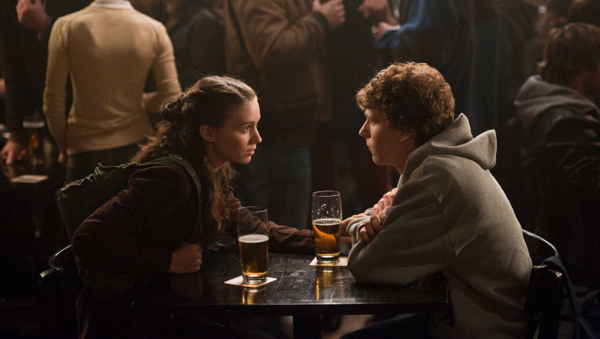Movie review by Greg Carlson
David Fincher and Aaron Sorkin print the legend in “The Social Network,” a sleek and confident imagining of the creation of Facebook. Agile enough to withstand nearly as many readings as there are Facebook users, the film pivots around a cautionary tale of a bright entrepreneur who wagers his soul gambling for fortune and recognition. In addition to his meteoric rise to the top of a media empire, Mark Zuckerberg’s single-mindedness and mercurial persona parallel Orson Welles’s Charles Foster Kane, and “The Social Network” swiftly transforms into something greater than another revenge of the nerds celebration to be cheered by the Net Generation.
Protests decrying the movie’s lack of accuracy – mostly from grumpy technology writers unhappy with the absence of computing detail and Facebook insiders shouting down the raging egos and emphasis on Dionysian socializing over the drudgery and hard work of endless coding sessions – will fail to be heard over the buzz of audience excitement. Like Oliver Stone’s “JFK” once upon a time, “The Social Network” represents history according to the movies, and as many of the essays in the Mark C. Carnes-edited volume “Past Imperfect” point out, fact-based truth can never be fully reconciled with dramatized fiction.
Sorkin’s dialogue is heir to the lightning exchanges and dueling witticisms of Preston Sturges, and “The Social Network” opens with a killer scene in which future billionaire Zuckerberg (Jesse Eisenberg) pours out buckets of insecurity to exasperated soon-to-be ex-girlfriend Erica Albright (Rooney Mara) over mugs of beer at the Thirsty Scholar Pub. Erica returns Mark’s insensitive insults with interest, and the dazzling duet – which reportedly required nearly one hundred takes to complete – establishes Zuckerberg’s mania for bluntness and his overwhelming desire to belong to something exclusive. Even though she only appears in a few scenes, Erica becomes emblematic of the young woman in the white dress described by Mr. Bernstein in “Citizen Kane.” She may even be Zuckerberg’s “Rosebud.”
Fincher also adopts a “Citizen Kane”-like jigsaw structure to divide the action between legal proceedings in two different lawsuits filed against Zuckerberg and the flashbacks to events described in testimony. Without any significant chronologic disorientation, Fincher and his terrific editors Kirk Baxter and Angus Wall mirror the sense of speed with which Facebook’s popularity exploded into a worldwide phenomenon, mapping out several dichotomies that define the film’s thematic agenda. Of these, the central struggle between unfettered artistic invention and the capitalistic urge to monetize manifests in the friendship between Zuckerberg and his business-focused, Jedediah Leland-esque best friend Eduardo Saverin (Andrew Garfield).
The most troubling single dimension of “The Social Network” is not the veracity of its claims of documentary honesty but the unfortunate way in which it portrays women. With the exception of Mara’s Erica, the majority of the female characters in the movie apparently exist to provide sexual favors to the male Facebook team once their efforts make them famous (and often with the added abuse of racial stereotype). Yes, Rashida Jones’s lawyer is briefly featured, but her appearance is the exception to a rule that literally shows attractive co-eds being bussed in to entertain Harvard men at a party. Surely Sorkin and Fincher are capable of exploring a point of view that includes female voices, even if the Facebook story is predominantly visualized through male eyes.
